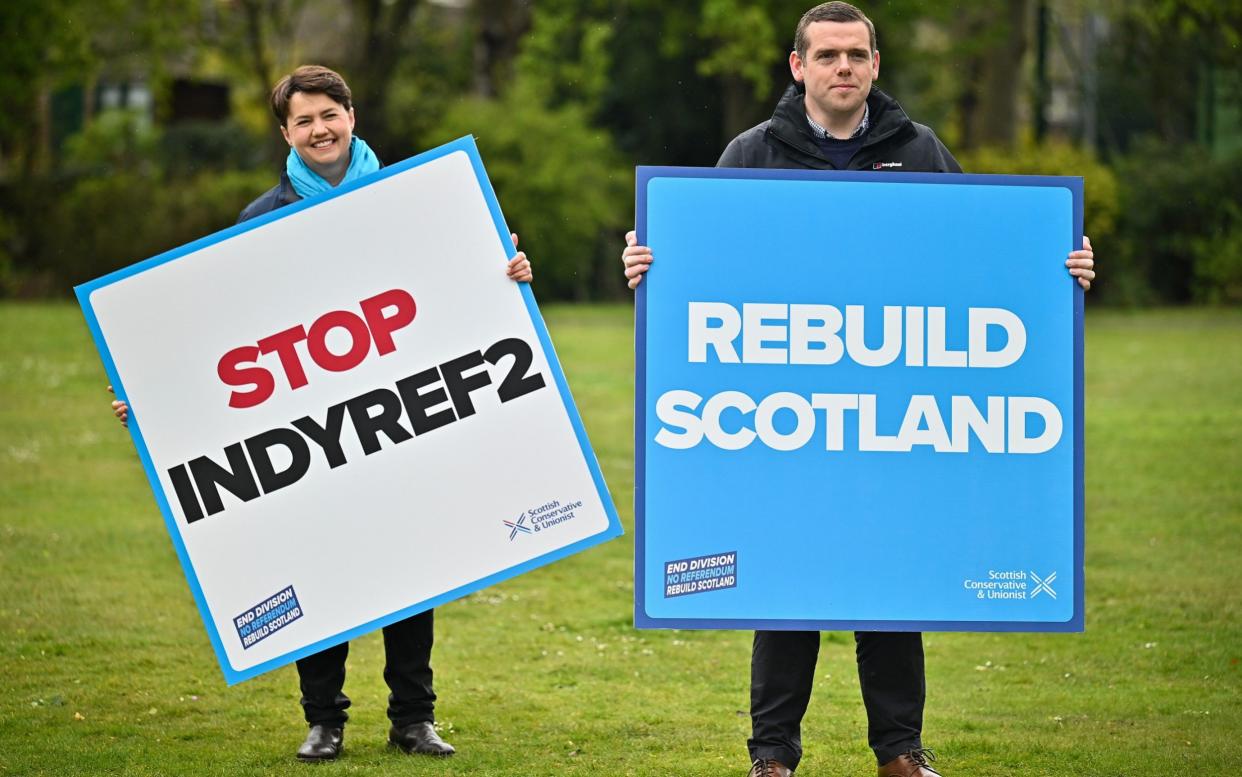Scottish Tory manifesto most popular on 'blind test', research finds

- Oops!Something went wrong.Please try again later.
- Oops!Something went wrong.Please try again later.
The Scottish Tories have the best manifesto for the Holyrood elections, according to a 'blind test' of voters who were presented with key policies without being told which party they belonged to.
A Savanta Comres survey, published on the eve of the crucial Scottish Parliament elections, found that 21 per cent of voters preferred the Conservative manifesto.
This compared to 15 per cent for the SNP, 14 per cent for the Greens, 13 per cent for Labour and 12 per cent for the LibDems.
The same poll also found that the SNP was on course to record its worst result in a Holyrood election since 2007, and would return just 59 MSPs, well short 65 required for an overall majority.
However, other surveys have predicted that Nicola Sturgeon's party would comfortably achieve their aim of winning most of the parliament’s 129 seats.
The SNP is set to claim a victory in the election as a mandate to hold a new referendum on independence, as long as seats for the Greens and Alex Salmond's Alba party mean there is a pro-independence majority overall at Holyrood.
However, the UK Government believes that if Ms Sturgeon falls short of a majority on her own it will make it far easier to win a battle for public opinion over whether a new referendum should go ahead, although Boris Johnson has no intention of allowing one regardless of the result.
"If these polling figures play out on Thursday's vote it'll likely leave the SNP short of the majority they desire and is a fair reflection of a 2021 in which the UK government performance, and a new Scottish Labour leader, have helped shore up the vote in Scotland for the main unionist parties," Chris Hopkins, Political Research Director at Savanta ComRes, said.
"However, with some constituency races very tight, these numbers do not even necessarily present bad news for the SNP, and if the drop in support we've seen in 2021 can be restricted to areas they're already strong, Thursday could still yield a strong, pro-independence feel to Holyrood when MSPs return."
The poll found the SNP were down three points to 42 per cent in the constituency vote. The Conservatives up two points in the constituency vote to 25 per cent, while Labour are down one point to 22 per cent. The Liberal Democrats are on eighth per cent.
The SNP dropped a further two points to 34 per cent in the regional list voting intention, Conservatives are up one to 23 per cent while Labour remain on 19 per cent.
The Green Party are on nine per cent, likely to be enough to see them increase their representation in Holyrood, while the Liberal Democrats are on six per cent, Alba on two per cent, and others on six per cent.
If repeated tomorrow, the result would mean a humiliation for Alex Salmond with his Alba Party on course to fail to win a single seat.
When presented with summaries of the key manifesto pledges of the five main parties standing in Scotland, but without the party names or labels attached to them, a fifth (21 per cent) of Scots say the Conservatives have the best manifesto.
Just 22 per cent of those planning to vote SNP say that the SNP manifesto is the best, while a quarter of those planning to vote Labour chose the Conservative manifesto as the best.
Meanwhile, the final study by YouGov for The Times of 1,144 Scots, released just hours before the last televised debate, put the SNP on 52 per cent in the constituency and 38 per cent on the regional list, and suggests the Scottish Greens will take 13 per cent of the regional vote.
It also found 45 per cent of people would vote yes in a referendum on Scottish independence while 55 per cent would vote no, when undecided voters were excluded.
Modelling by polling expert Professor Sir John Curtice, based on the YouGov results, has the SNP on 68 seats, three more than needed for a majority, while the Greens will take 13 seats, more than double their current haul of five.

